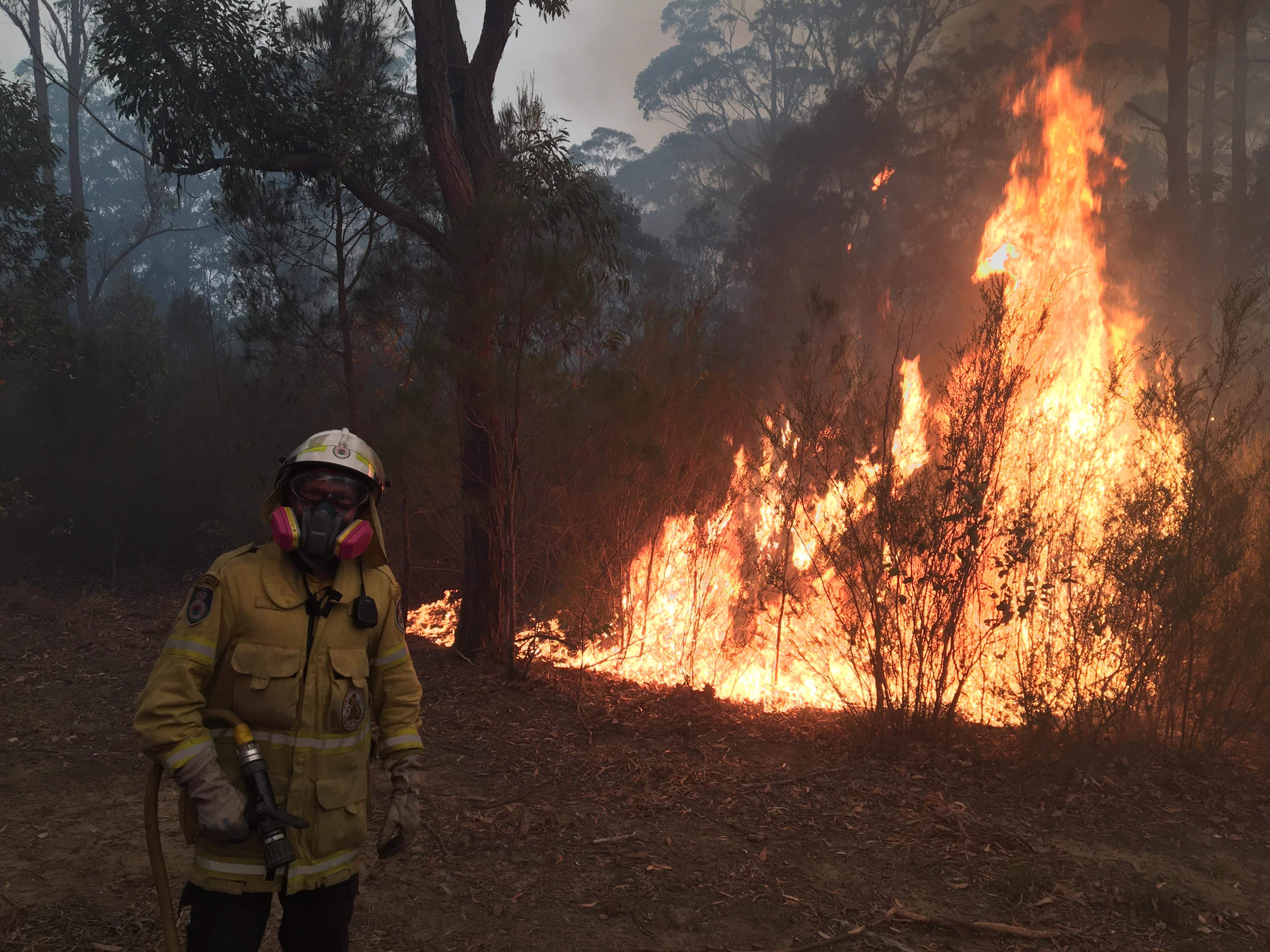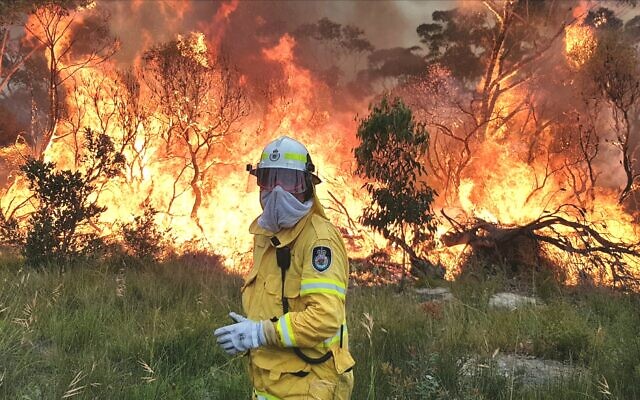Jewish firefighters, police on the front line
New South Wales Rural Fire Service volunteer Joshua Todes said seeing homes destroyed is the hardest part.
SEVERAL Jewish firefighters and service people have been at the epicentre in fighting the fires that have gripped the nation.
For New South Wales Rural Fire Service (RFS) volunteer, Joshua Todes, the sight of an entire street of houses ablaze in Buxton has stayed with him.
Just one day after completing his HSC exams, the 18-year-old Moriah College graduate faced the fire front. Since then, he has been a part of the efforts at Gospers Mountain, Green Wattle Creek, Little L Complex and Lithgow.
Speaking to The AJN this week, Todes explained how evacuated residents often leave letters taped to their front doors, thanking the firefighters and expressing their appreciation.
“Seeing these letters and then their homes destroyed, that really hit me hard.
“But the RFS have done such a great job in protecting some of these communities, I’ve been amazed,” Todes added.
“It has been very intense at times, and then there are a lot of periods of waiting.”
Reflecting on the millions of native animals killed by the bushfires, Todes said he’s seen a number of kangaroos hopping at the front. But he added, “The wildlife losses are gut-wrenching to see.”
The teen qualified as a firefighter for the Loftus Volunteer Bushfire Brigade in the Sutherland Shire last March, inspired to “serve my country” after the events of Black Saturday.
He is now set to leave in order to begin his career in the Australian Army in the coming days.
David Katzen, a 2018 Moriah College graduate, also joined the fight with the Mittagong Brigade. Meanwhile, former AJN photographer Noel Kessel has been volunteering on the fire trail in the Blue Mountains over the past month.
Speaking from the front as a water-bomber helicopter whirred above on Tuesday, Kessel described the morale among the firefighters as “pretty positive”, irrespective of the fatal accident last month which saw the death of two volunteer firefighters at Buxton when their firetruck overturned.
“It happened right where we were working. And we had been working with that crew throughout the day,” said Kessel.
Indeed, that same day in Buxton, Kessel along with some of his fellow Cottage Point RFS crew members became trapped as they were protecting a house.
The crew was forced to seek refuge in the firetruck for ‘burnover’ – when a sudden change in wind direction leaves firefighters no other option than to rely on the protective technology of the firetruck, as the fire literally burns over the vehicle.
“This was very, very scary and frightening,” told Kessel, “But, you have faith in Hashem, and say ‘Shema Yisrael’. What else can you do? You bring down the blinds, and the sprinklers are on … It would have lasted for around 10 minutes. The flames all around you. We lost the hoses, they caught on fire.”

A special rescue team and water cannon truck were sent in to aid the crew.
With flames up to 70 metres high, Kessel noted conditions to be “a lot more aggressive, and a lot more unpredictable” than anything he has seen since he joined the RFS 34 years ago, but he said it is often “the little things” that keep the crews positive.
“The biscuits sent by [community initiative] Our Big Kitchen have been great. We always keep some in the truck and have them when we get the chance for a breather. All the guys love them.”
Rob Conwell has been a volunteer firefighter for more than 30 years, and was a former superintendent for the NSW RFS for 10 years. No longer on the front, he manages the Operations Support Unit at the Mount Lofty Group Fire Control Centre in South Australia. Up until mid-December, he deployed crews and strike teams to NSW – then the Cudlee Creek fire began in the Adelaide Hills – a district that is also home to at least 10 or 20 Jewish families, he told. Eighty-two homes have since been lost, and more than 25,000 hectares have been burned.
“These are bad. They don’t come very often, thank goodness. When we get very hot days and high winds, a fire will start to create its own weather,” said Conwell.
“Firefighters are facing 50-plus degree temperatures at the front. What you hear first, is a roar like a tornado or a train. It is a horrendous sound that is coming towards you, it is so loud. The wind is roaring. Then, as it goes through, it changes direction. You have ember attack. It goes very dark. Literally there are millions of embers in the winds firing at you.”
The unpredictability of fire was also experienced by Victoria Police officer Rowan Epstein. The Camberwell Police Station Sergeant was indefinitely dispatched to Cann River in Gippsland last Monday. After spending the day managing the roads, preventing the public from entering fire-affected areas, he and his colleagues manned the evacuation centre at the local school, which held the town’s population of 150. He shut his eyes at midnight, only to be woken at 2am. The nearby fire had turned. It was heading straight for the town, and the blocked roads prevented further Country Fire Authority (CFA) assistance from being able to reach them.
With just a few CFA volunteers on site, they quickly shared their knowledge with police.
“Cann River wasn’t meant to be affected the way it was, but we were ready to jump on the hoses,” said Epstein.
The fire reached three kilometres outside of the town, before luckily changing direction.
“The hardest thing was not knowing. We’re not firefighters, we don’t know how they move. We didn’t know what was going to happen.”
Cann River lost all electricity, telecommunications and access to banking. The townspeople survived on generators and food donated by the local cafe and supermarket, and cooked by the State Emergency Service. Then, last Thursday, the order was given to evacuate the town as the fire danger was anticipated to again increase on Saturday. But amazingly, it was spared once more. This time, the fire came just one kilometre from the town’s outskirts.
Reflected Epstein, “There is no loss of life, and no one is missing.”
“Houses can be rebuilt, but lives can’t, so we were pretty lucky to escape.”


comments